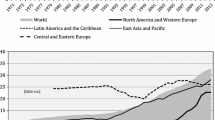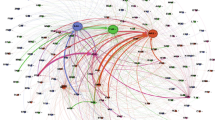Abstract
Since the Brexit referendum in 2016, and the formal act of triggering article 50 by Theresa May’s cabinet in 2017, the UK has entered a period of negotiations, the outcome of which, and also the terms of the post-exiting phase, are still uncertain. In this period of uncertainty, the mobility of people is one of the main issues at stake. The topic is important for the higher education sector where the percentage of (other) European Union staff in UK universities has grown at an impressive rate in recent years before the Brexit referendum. This paper draws from official Higher Education Statistic Agency (HESA) data to investigate if there is any inversion of this trend in the British system, arguing that some ‘Brexodus’ of academic staff - meaning a decrease in the percentage of other EU nationals - has already started for some academics, namely the youngest and the brightest.
Similar content being viewed by others
References
Ackers, L. (2008). Internationalisation, mobility and metrics: A new form of indirect discrimination? Minerva, 46, 411–435.
Ackers, L., & Gill, B. (2005). Attracting and retaining ‘early career’ researchers in english higher education institutions. Innovation, 78(2), 277–299.
Ackers, L., & Gill, B. (2008). Moving people and knowledge: Scientific mobility in an enlarging european union. Cheltenham, UK: Edward Elgar.
Altbach, P. G. (2004). Globalisation and the university: Myths and realities in an unequal world. Tertiary Education & Management, 70(2), 3–25.
Appelt, S., van Beuzekom, B., Galindo-Rueda, F., & de Pinho, R. (2015). Which factors influence the international mobility of research scientists? In A. Geuna (ed.), Global mobility of research scientists: The economics of who goes where and why. Amsterdam: Elsevier.
Bauder, H. (2006). Labor movement: How migration regulates labor markets. New York: Oxford University Press.
Bauder, H. (2012). The international mobility of academics: A labour market perspective. International Migration, 53(2), 83–96.
Beechler, S., & Woodward, I. C. (2009). The global “war for talent”. Journal of International Management, 15, 273–285.
Boeri, T., Brucker, H., Docquier, F., & Rapoport, H. (eds). (2012). Brain drain and brain gain: The global competition to attract high-skilled migrants. Oxford: Oxford University Press.
Boring, P., Flanagan, K., Gagliardi, D., Kaloudis, A., & Karakasidou, A. (2015). International mobility: Findings from a survey of researchers in the EU. Science and Public Policy, 42, 811–826.
Brücker, H., Bertoli, S., Facchini, G., Mayda, A. M., & Peri, G. (2012). Conclusions to part I. In T. Boeri, H. Brucker, F. Docquier, & H. Rapoport (eds), Brain drain and brain gain: The global competition to attract high-skilled migrants. Oxford: Oxford University Press.
CABS. (2017). Annual membership survey 2017: Results. London: Charted Association of Business Schools.
Colantone, I., & Stanig, P. (2018). Global competition and brexit. American Political Science Review, 112(2), 201–218.
Florida, R. (2005). The flight of the creative class: The new global competition for talent. New York: HarperBusiness.
Furukawa, T., Shirakawa, N., & Okuwada, K. (2013). An empirical study of graduate student mobility underpinning research universities. Higher Education, 66, 17–37.
Guthrie, S., Lichten, C., Harte, E., Parks, S., & Wooding, S. (2017). International mobility of researchers. A survey of researchers in the UK. California US: Santa Monica. https://doi.org/www.rand.org/pubs/research_reports/RR1991.html
Hope, C. (2018, May 10). Fears of ‘Brexodus’ of academics from Britain’s universities are ‘a myth’, figures show. The Telegraph. Retrieved from: https://doi.org/www.telegraph.co.uk
House of Commons, Education Committee (2017a, April). Exiting the EU: challenges and opportunities for higher education: ninth report of session 2016-17. London, UK.
House of Commons, Education Committee. (2017b, October). Response to house of commons, education committee exiting the EU: Challenges and opportunities for higher education: Ninth report of session 2016-17. UK: London.
Kim, D., Bankart, C., & Isdell, L. (2011). International doctorates: Trends analysis on their decision to stay in US. Higher Education, 62(2), 141–161.
Kim, T. (2009). Shifting patterns of transnational academic mobility: A comparative and historical approach. Comparative Education, 45(2), 387–403.
Kim, T. (2014). Internationalisation of higher education and global mobility. Comparative Education, 50(4), 507–509.
Kreber, C., & Hounsell, J. (2014). Being an international academic: A phenomenological study of academic migrants adjusting to working and living in Scotland. In N. Maadad & M. Tight (Eds.), Academic mobility (Vol. 11, pp. 9–33). Bingley: Emerald.
Lee, J. T., & Kuzhabekova, A. (2017). Reverse flow in academic mobility from core to periphery: Motivations of international faculty working in kazakhstan. Higher Education.
Leisyte, L., & Rose, A. L. (2017). Academic staff mobility in the age of trump and brexit? International Higher Education, 89, 5.
Li, Z., & Lowe, J. (2015). Mobile student to mobile worker: The role of universities in the ‘war for talent’. British Journal of Sociology of Education, 37(2), 11–29.
Lin, Z., Pearce, R., & Wang, W. (2009). Imported talents: demographic characteristics, achievement and job satisfaction of foreign born full time faculty in four-year american colleges. Higher Education, 57(2), 703–721.
Maadad, N., & Tight, M. Eds., (2014). Editorial introduction. Academic mobility. Bingley Emerald, 1, 11–7.
Marginson, S. (2006). Dynamics of national and global competition in higher education. Higher Education, 52, 1–39.
May, T. (2017, September 22). PM’s Florence speech: A new era of cooperation and partnership between the UK and the EU. Retrieved from: https://doi.org/www.gov.uk/government/speeches/pms-florence-speech-a-new-era-of-cooperation-and-partnership-between-the-uk-and-the-eu
Michaels, E., Handfield-Jones, H., & Axelrod, B. (2001). The war for talent. Boston: Harvard Business Press.
MORE2. (2013). Support for continued data collection and analysis concerning mobility patterns and career paths of researchers. EU commission report. Brussels: European Commission.
Ng, P. T. (2013). The global war for talent: Responses and challenges in the Singapore higher education system. Journal of Higher Education Policy and Management, 35(2), 280–292.
Piore, M. J. (1979). Birds of passage: migrant labor and industrial societies. Cambridge: Cambridge University Press.
Robertson, S. (2010). Corporatisation, competitiveness, commercialization: New logics in the globalizing of UK higher education. Globalisation, Societies and Education, 8(2), 191–203.
Scott Metcalfe, A. (2016). Nomadic political ontology and transnational academic mobility. Critical Studies in Education, 58(2), 131–149.
Scott, P. (2015). Dynamics of academic mobility: Hegemonic internationalisation or fluid globalisation. European Review, 23(2), 55–69.
Shapira, M. (2018) Brexodus of EU citizens from the UK is picking up speed. The Conversation. 22nd February 2018.
Teichler, U. (2015). Academic mobility and migration: What we know and what we do not know. European Review, 23(2), 6–37.
UCEA. (2017). Higher education workforce survey 2017. London: University & Colleges Employers Association.
University UK. (2018, March). How can the government ensure universities are best placed to maximise their contribution to a successful and global UK post-EU exit? London: UUK, Retrieved from https://doi.org/www.universitiesuk.ac.uk/policy-and-analysis/reports/Documents/2018/brexit-briefing-march-18.pdf.
Van der Wende, M. (2015). International academic mobility: Towards a concentration of the minds in europe. research & occasional. paper series: CSHE.3.14, Center for Studies in Higher Education, University of Berkeley, US.
Welch, A. R., & Zhen, Z. (2008). Higher education and global talent flows: Brain drain, overseas Chinese intellectuals, and diasporic knowledge networks. Higher Education Policy, 27(2), 519–537.
Author information
Authors and Affiliations
Corresponding author
Rights and permissions
About this article
Cite this article
Marini, G. Higher education staff and Brexit. Is the UK losing the youngest and brightest from other EU countries?. Tert Educ Manag 24, 409–421 (2018). https://doi.org/10.1080/13583883.2018.1497697
Received:
Accepted:
Published:
Issue Date:
DOI: https://doi.org/10.1080/13583883.2018.1497697




